Latest Theta News
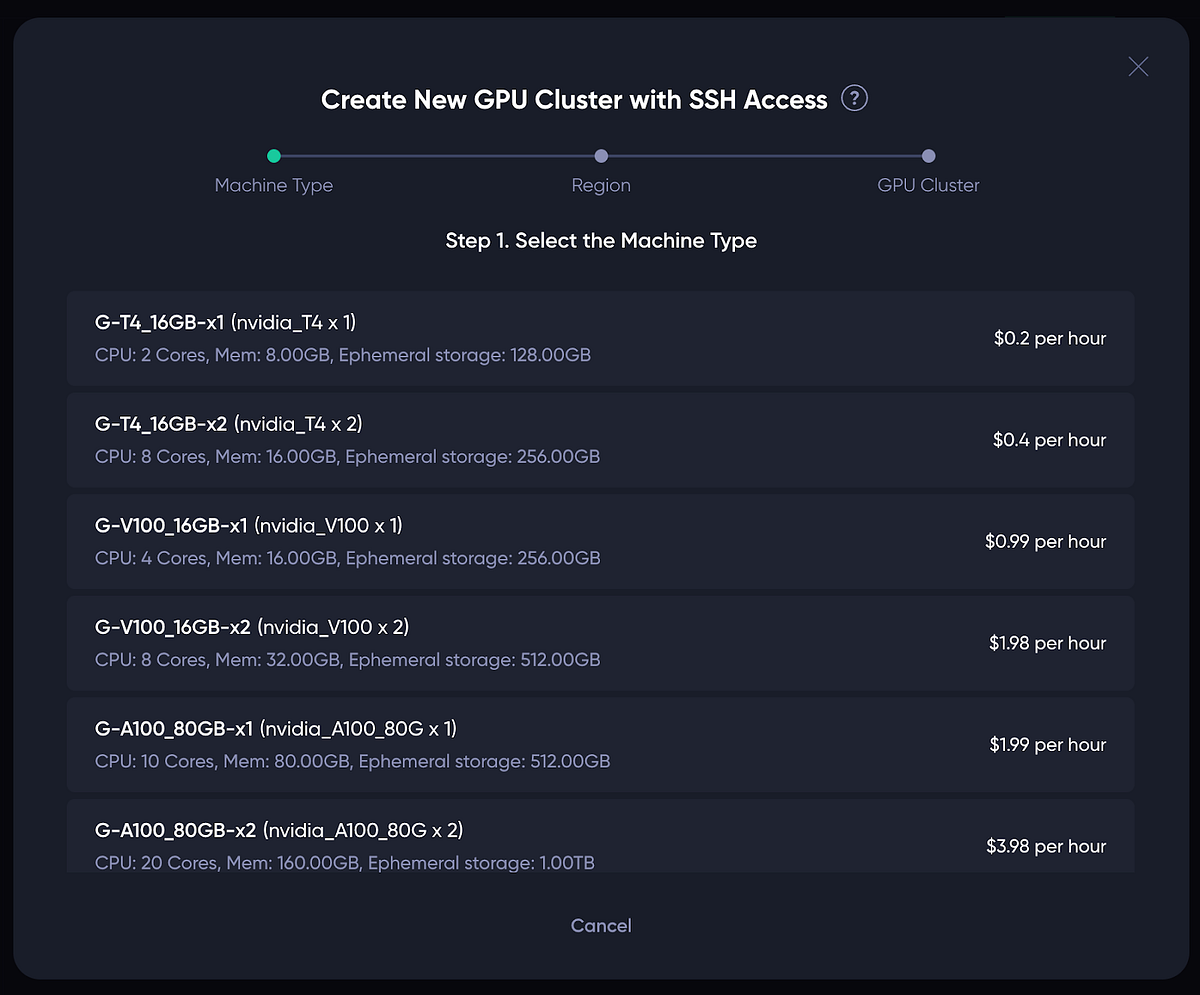
a day ago
Theta EdgeCloud Launches GPU Clusters for Enhanced AI Model Training
Theta EdgeCloud has introduced a significant enhancement by enabling users to launch GPU clusters, which are essential for training large AI models. This new feature allows the creation of clusters composed of multiple GPU nodes of the same type within a specific region, facilitating direct communication among nodes with minimal latency. This capability is crucial for distributed AI model training, as it allows for parallel processing across devices. Consequently, tasks that traditionally required days or weeks to complete on a single GPU can now be accomplished in hours or even minutes, significantly accelerating the development cycle for AI applications.
The introduction of GPU clusters not only enhances training efficiency but also supports horizontal scaling, allowing users to dynamically add more GPUs as needed. This flexibility is particularly beneficial for training large foundation models or multi-billion parameter architectures that exceed the memory capacity of a single GPU. The demand for this feature has been voiced by numerous EdgeCloud customers, including leading AI research institutions, highlighting its importance in the ongoing evolution of Theta EdgeCloud as a premier decentralized cloud platform for AI, media, and entertainment.
To get started with GPU clusters on Theta EdgeCloud, users can follow a straightforward three-step process. This includes selecting the machine type, choosing the region, and configuring the cluster settings such as size and container image. Once the cluster is created, users can SSH into the GPU nodes, enabling them to execute distributed tasks efficiently. Additionally, the platform allows for real-time scaling of the GPU cluster, ensuring that users can adapt to changing workloads seamlessly. Overall, this new feature positions Theta EdgeCloud as a competitive player in the decentralized cloud space, particularly for AI-driven applications.

3 days ago
Sungkyunkwan University’s AIM Lab Adopts Theta EdgeCloud for AI Research Advancement
Sungkyunkwan University’s AI & Media Lab (AIM Lab), led by Professor Sungeun Hong, has become the 32nd academic institution globally to adopt Theta EdgeCloud, a decentralized GPU infrastructure tailored for AI and machine learning research. This partnership will significantly enhance the AIM Lab's capabilities in areas such as multimodal learning, domain adaptation, and 3D vision. Notably, their recent work, supported by Samsung, titled "Question-Aware Gaussian Experts for Audio-Visual Question Answering," has been accepted as a Highlight Paper at CVPR 2025, one of the most prestigious AI conferences. The integration of Theta EdgeCloud will allow researchers to access high-performance GPU resources on demand, facilitating faster iterations while reducing costs.
Professor Hong, an expert in multimodal AI and robotic perception, emphasizes the advantages of Theta EdgeCloud in providing the necessary computing flexibility to advance their research. The AIM Lab's focus on vision-language modeling and privacy-preserving domain transfer will benefit from the decentralized architecture, enabling rapid training and evaluation of models. The collaboration with Samsung further strengthens the lab's research output, showcasing a strategic relationship that enhances the development of impactful AI technologies.
The AIM Lab's recent achievements, including the innovative QA-TIGER model for video question answering and a memory-efficient attention mechanism for image segmentation, highlight the lab's commitment to cutting-edge research. By joining a network of esteemed institutions leveraging Theta EdgeCloud, such as Stanford and KAIST, Sungkyunkwan University is poised to lead in the advancement of AI innovation. This partnership not only accelerates research but also positions the AIM Lab at the forefront of developing socially relevant AI applications, demonstrating the power of academic-corporate collaboration in the tech landscape.

4 days ago
Blockchain Fundraising Surges with $267M Raised in a Week
Last week, the blockchain fundraising landscape witnessed a significant surge, with 26 projects collectively raising a remarkable $267 million. The standout was World Foundation, which successfully completed a $135 million public token sale aimed at creating a proof-of-personhood protocol that facilitates universal digital identification and global financial access. Following closely was Catena Labs, which secured $18 million in seed funding to develop an AI-native financial institution. Other notable projects included Roxom, True Markets, and Hyperdrive, each attracting substantial investments to enhance their innovative offerings in the blockchain space.
In addition to fundraising, the week also saw notable mergers and acquisitions (M&A) that are reshaping the blockchain ecosystem. DePIN Pulse made headlines by acquiring DePIN.Ninja and Who Loves Burrito, consolidating fragmented data within the DePIN ecosystem. This strategic move aims to streamline operations and enhance data analytics capabilities. Meanwhile, Alchemy expanded its portfolio by acquiring NFT launchpad HeyMint, which provides no-code tools for NFT creation, thereby bolstering its Smart Wallets initiative. Apex Group also announced plans to acquire Tokeny, further solidifying its commitment to digital asset infrastructure.
On the venture capital front, Theta Capital Management launched Theta Blockchain Ventures IV, a $175 million fund-of-funds dedicated to supporting crypto-native VCs focused on early-stage blockchain startups. This fund aims to leverage the expertise of specialist managers to navigate the evolving landscape of digital assets. Insights from industry experts highlighted a shift in crypto VC dynamics, with a focus on long-term fundamentals rather than speculative investments. As the sector continues to mature, these developments signal a promising trajectory for blockchain innovation and investment.

9 days ago
Theta Capital Management Raises $175 Million for Blockchain Startups
Amsterdam-based Theta Capital Management has successfully raised over $175 million for its latest fund-of-funds, Theta Blockchain Ventures IV, which is designed to support early-stage blockchain startups through specialized venture capital (VC) firms. Ruud Smets, managing partner and chief investment officer at Theta, emphasized that the new fund will invest in crypto-native VC firms known for their ability to back blockchain innovation. Smets highlighted the importance of specialization in the VC space, stating that dedicated crypto VCs have developed a competitive edge over generalist investors, particularly in the initial funding rounds. Since shifting its focus to digital assets in 2018, Theta has managed approximately $1.2 billion and has invested in prominent firms like Polychain Capital and CoinFund.
The launch of Theta Blockchain Ventures IV coincides with a resurgence in crypto venture capital, as reported by Galaxy Digital, which noted a 54% increase in VC investment in digital assets during the first quarter of 2025, totaling $4.8 billion. This uptick signals a renewed confidence in the crypto sector following a period of downturn. Despite a decline in the number of deals—405 completed in Q1 2025 compared to 670 in the same period last year—total funding more than doubled year-over-year, reaching $6 billion, up from $2.6 billion in Q1 2024. This indicates that while fewer deals are being made, the overall investment in the sector remains robust.
Furthermore, PitchBook's analysis revealed that the majority of the funding, approximately $2.55 billion, was directed towards asset management, trading platforms, and crypto financial services. Infrastructure and development firms also attracted significant investment, raising nearly $955 million. Web3-focused companies followed, securing $231.2 million across 23 deals. Additionally, the anticipated IPO of Circle is expected to be a pivotal moment for the crypto equity market, potentially influencing valuation expectations across the payments and infrastructure sectors. With $1.18 billion in VC funding raised so far, PitchBook estimates a 64% likelihood that Circle will go public, which could further invigorate the market.

10 days ago
Qubetics: The Next Crypto to Hit $1?
As the digital asset market begins to recover from recent volatility, investors are shifting their focus from speculation to real-world utility and long-term adoption potential. One standout project gaining attention is Qubetics ($TICS), which positions itself as the world's first Web3 aggregator. By combining asset tokenization with a robust marketplace, Qubetics aims to convert physical and digital assets into tradable digital tokens, thus addressing one of blockchain's most pressing challenges. This innovative approach not only enhances accessibility to various asset classes but also empowers businesses and individuals to engage in seamless trading, making Qubetics a key player in the race to hit $1.
In addition to Qubetics, other tokens like Kaspa (KAS) and Theta (THETA) are also gaining traction. Kaspa utilizes a high-throughput blockDAG model to achieve rapid transaction speeds, making it a strong contender for decentralized technology. Meanwhile, Theta focuses on creating a decentralized content delivery network for video streaming, rewarding users who contribute bandwidth. Both projects are backed by passionate developer communities and are carving their own paths towards mass adoption, showcasing unique narratives that set them apart in the competitive crypto landscape.
The Qubetics presale is currently in its 35th stage, with over $17 million raised and a growing number of early adopters. The presale operates on a 7-day cycle, creating continuous price momentum ahead of the mainnet launch in Q2 2025. As the demand for Qubetics continues to rise, it is increasingly viewed as a leading candidate for the next crypto to hit $1, driven by its focus on real-world utility and strategic growth. With its innovative marketplace and cross-chain compatibility, Qubetics is not just another crypto project; it is a potential disruptor in the financial landscape, making it an attractive option for investors looking for long-term gains.

15 days ago
Crypto Market Resurgence: Theta, Gala, and PayFi Lead the Charge
The crypto market is experiencing a resurgence, with notable gains in tokens like Theta, Gala, and Sandbox, which have reignited interest in the metaverse and GameFi sectors. Theta Network has seen a remarkable 37% price increase, buoyed by a partnership with Nanyang Technological University to develop EdgeCloud AI infrastructure. This collaboration aims to enhance decentralized video streaming and NFT platforms, positioning Theta as a leader in AI-powered Web3 services. Despite a slight price correction, the overall trend remains bullish, reflecting growing investor confidence.
Gala Games is also riding a wave of optimism, with its token GALA surging nearly 47% following a high-profile partnership with the White House to create a Web3-based Easter Egg Hunt game set for 2025. This unexpected collaboration has not only boosted GALA's price but also sparked interest in the GameFi sector, leading to a broader uplift in the crypto market. The sustained gains and high buying interest indicate a strong recovery and renewed enthusiasm among investors, showcasing Gala's potential for mainstream adoption.
Amidst these developments, PayFi is emerging as a transformative force in the crypto landscape. Platforms like Remittix are redefining cross-border payments by enabling instant crypto-to-fiat transfers without requiring users to have extensive crypto knowledge. With support for over 50 crypto pairs and a user-friendly interface, PayFi is poised to revolutionize real-world finance. As the crypto market continues to evolve, the focus on practical innovations like PayFi suggests that 2025 could mark a significant shift toward mainstream adoption of blockchain technology in everyday financial transactions.
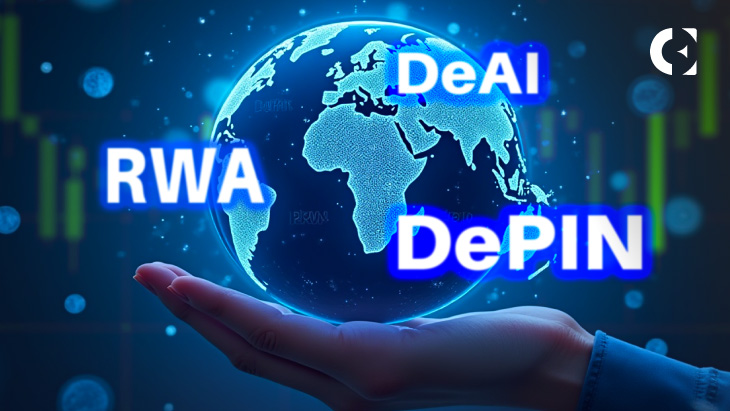
15 days ago
Exploring the Growth of RWAs, DePINs, and DeAI in 2025
In May 2025, the tokenization of real-world assets (RWAs) has surged, reaching a valuation of $22.5 billion, with projections suggesting it could hit $50 billion by the end of the year. This growth is largely attributed to the increasing integration of decentralized finance (DeFi) with traditional financial assets, such as real estate and government bonds. Notably, institutional investors like BlackRock and Goldman Sachs are playing a pivotal role in this expansion. The U.S. Securities and Exchange Commission (SEC) has also shown a commitment to this sector by hosting a tokenization roundtable, signaling a positive regulatory environment for RWAs. Analysts predict that the RWA market could grow to a staggering $10 trillion by 2030, highlighting its potential to dominate the crypto landscape in the coming years.
Alongside RWAs, the Decentralized Physical Infrastructure Networks (DePIN) market is projected to reach $3.5 trillion by 2028. DePIN aims to revolutionize physical infrastructure by utilizing blockchain technology to create decentralized networks for computing, storage, and connectivity. This innovative approach could disrupt various industries, including telecommunications and IoT. Leading projects such as Theta Network and Akash Network are at the forefront, providing cost-effective solutions for AI workloads and IoT applications. The growing interest in decentralized energy grids and smart cities further emphasizes the importance of DePINs in the evolution of Web3.
The Decentralized Artificial Intelligence (DeAI) sector is also on the rise, merging blockchain with AI to foster transparent and censorship-free ecosystems. With the AI and RWA crypto token market already valued at over $65 billion, DeAI is poised for significant growth, driven by advancements in decentralized computing. Platforms like SingularityNET and Fetch.ai are leading the way in creating decentralized AI models. The interconnectedness of RWAs, DePINs, and DeAI suggests a synergistic relationship that could redefine the future of the crypto cycle in 2025, provided that challenges such as scalability and regulatory hurdles are effectively addressed.
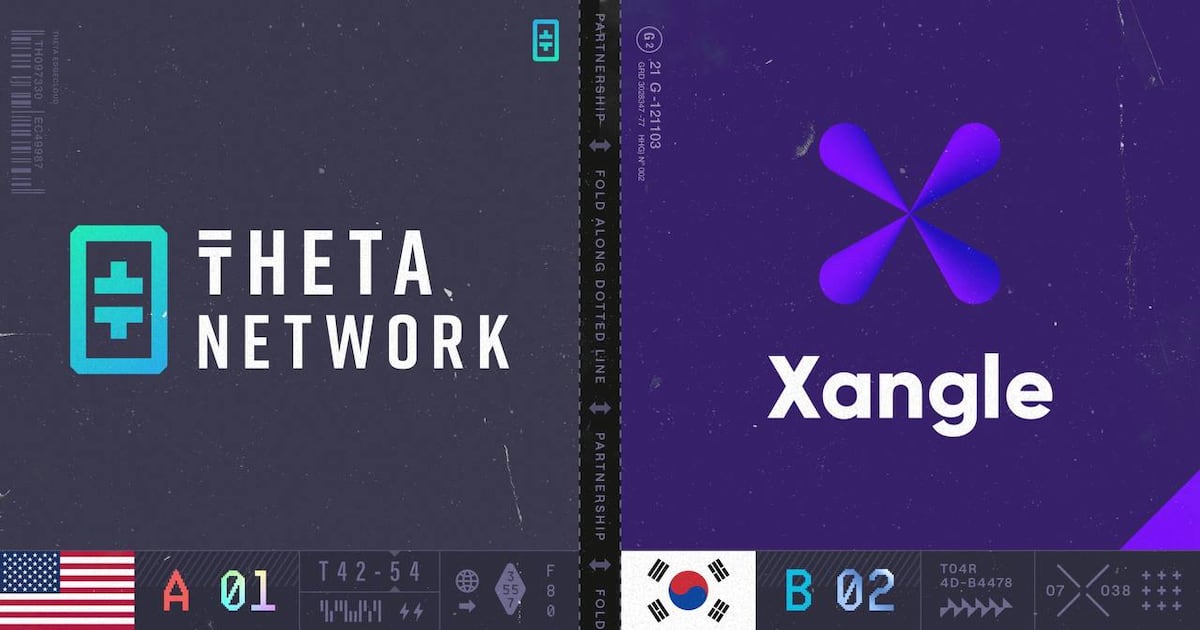
21 days ago
Xangle Joins Theta Network as Enterprise Validator, Enhancing Blockchain Infrastructure
On the 9th, blockchain infrastructure corporation Xangle announced its entry into the global blockchain mainnet Theta Network as an enterprise validator. Theta Network is renowned for providing decentralized cloud infrastructure tailored for sectors such as artificial intelligence (AI), media, sports, and entertainment. It boasts a robust framework supported by over 30,000 distributed edge nodes worldwide, ensuring efficient operation and governance. The network has garnered strategic investments from notable entities including Samsung Next, Sony Innovation Fund, Bertelsmann Digital Media Investments, and Creative Artists Agency (CAA), with global giants like Google, Samsung, and Binance also participating as enterprise validators.
As part of its commitment to the Theta ecosystem, Xangle will stake a total of 200,000 Theta (THETA) tokens, significantly enhancing network security and governance as a validator node. The company aims to actively contribute to the expansion of the decentralized physical infrastructure network (DePIN) and the AI ecosystem that Theta promotes. Founded in 2018, Xangle has established itself as a leading web3 infrastructure service provider and research platform in Korea, offering community hubs, blockchain explorers, and comprehensive web3 industry analysis reports. It has also served as a validator for various global projects, including Aptos, Babylon, 0G, and Initia.
Lee Hyun-woo, co-CEO of Xangle, expressed enthusiasm about the partnership, stating, "We are very pleased to be listed as an enterprise validator alongside Google, Samsung, and CAA through our strategic partnership with Theta." He emphasized that staking in Theta's validator network aligns perfectly with Xangle's mission to enhance trust, decentralization, and transparency in layer 1 blockchains. Mitch Liu, co-founder and CEO of Theta Network, echoed this sentiment, highlighting Xangle's strengths in blockchain analysis and ecosystem development, and anticipating significant synergies in promoting Theta (THETA) and Theta Fuel (TFUEL), along with enhancing the overall security and scalability of the Theta blockchain.
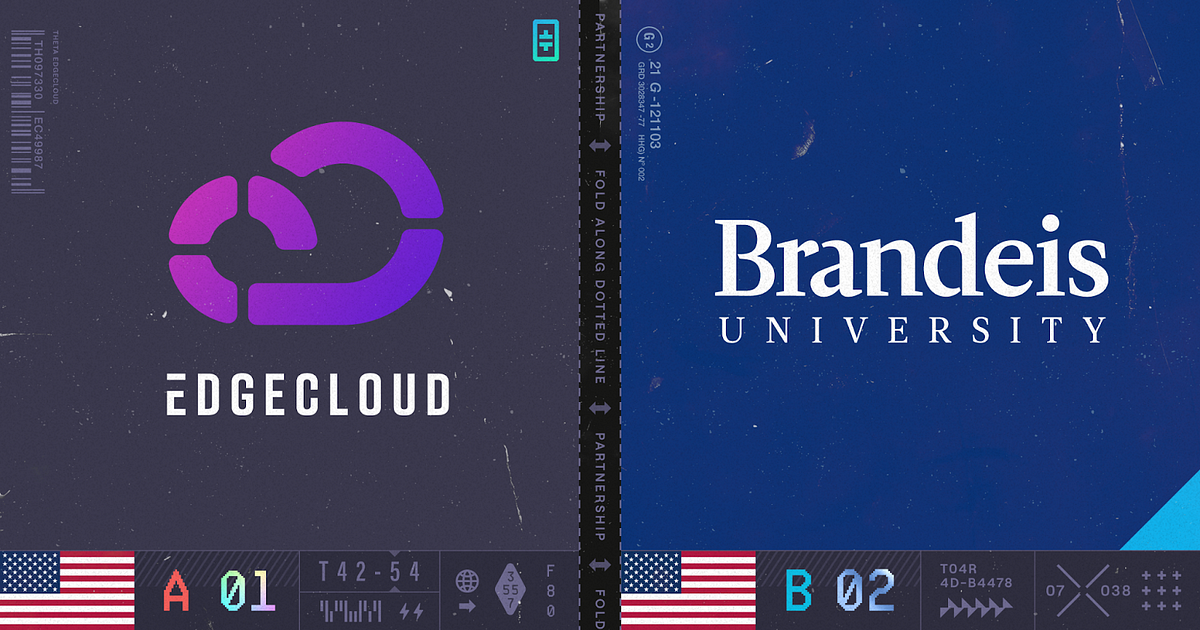
25 days ago
Theta Network Partners with Brandeis University to Enhance AI Research
Theta Network has announced a significant partnership with the Liu Lab at Brandeis University, led by Professor Hongfu Liu, to utilize Theta EdgeCloud for enhancing machine learning (ML) and artificial intelligence (AI) research. This collaboration marks a pivotal moment for Theta as it solidifies its position as a leader in decentralized GPU infrastructure for academic research. The Liu Lab joins a prestigious list of institutions, including Stanford University and Seoul National University, that are leveraging EdgeCloud’s hybrid GPU capabilities to boost productivity in AI research. By integrating these decentralized resources, the lab can access scalable and high-performance computing power, which is crucial for advancing their research initiatives in data-centric learning and clustering analysis.
Professor Liu emphasized the benefits of this integration, stating that the flexibility and cost-effectiveness of Theta EdgeCloud allow their team to focus on innovative research projects without the burden of managing extensive computational resources. The lab's research primarily revolves around data-centric learning, which prioritizes the quality and diversity of training data over mere algorithm refinement. This approach is essential for developing reliable and fair machine learning models, as it ensures that the datasets used are well-annotated and representative of real-world scenarios. The Liu Lab's ongoing studies in this domain include various applications such as noisy label correction and active learning, showcasing the breadth of their research capabilities.
Theta EdgeCloud’s decentralized infrastructure not only empowers the Liu Lab but also supports a wider academic community by providing on-demand, high-performance computing resources. This initiative allows researchers to dynamically allocate resources, optimizing both performance and cost for large-scale projects. As Theta Network continues to partner with leading institutions, it aims to facilitate groundbreaking research in AI and machine learning, ensuring that researchers can focus on their work without the constraints of traditional computing limitations. This collaboration represents a significant step forward in making advanced AI research more accessible and efficient for academic institutions worldwide.
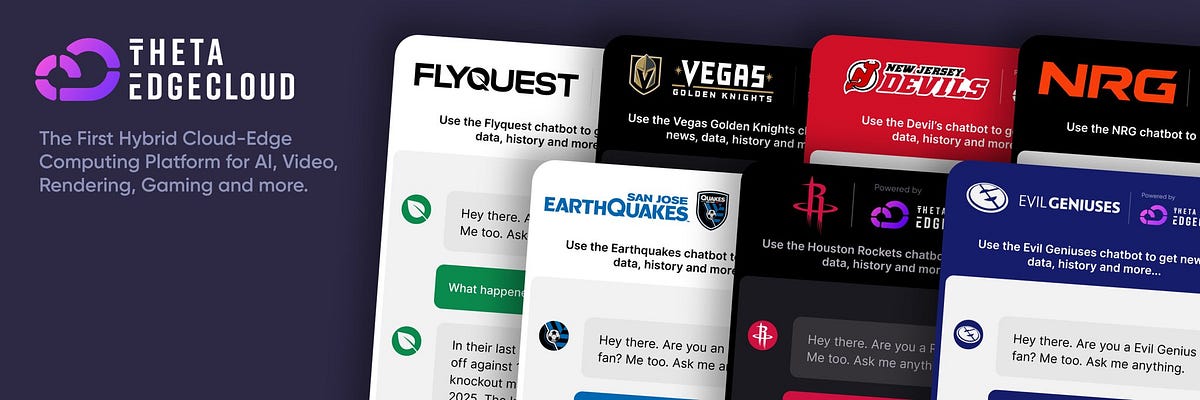
a month ago
Theta Ecosystem Expands with AI Innovations and Sports Collaborations
The Theta ecosystem is witnessing significant growth and adoption across various sectors, including sports, media, academia, and AI startups. In the latest April roundup, Theta has made headlines with its collaboration with the NBA's Houston Rockets, launching an innovative AI-powered mascot named "ClutchBot." This initiative marks a pivotal moment for Theta as it expands its influence in professional sports, showcasing the potential of AI technology in enhancing fan engagement and experience.
In addition to its partnership with the Houston Rockets, Theta is also making strides in Major League Soccer (MLS) by assisting the San Jose Earthquakes in launching the league's first interactive AI agent chatbot. This development highlights Theta's commitment to integrating AI solutions into sports, further establishing Theta EdgeCloud as a leading platform for AI applications in both professional sports and esports. The platform continues to attract a growing roster of team partners, solidifying its position in the market.
Moreover, academic institutions are increasingly recognizing the value of Theta's technology. Stanford University's AI Lab, led by Professor Vitercik, has begun utilizing Theta EdgeCloud for AI research, demonstrating the platform's versatility beyond sports. Theta has also introduced the first decentralized On-demand AI Model API Service, which adds more AI models to EdgeCloud. This expansion is complemented by top esports teams like NRG and EvilGeniuses launching their own Agentic AI chatbots powered by EdgeCloud. As the Theta World Tour continues at events like Paris Blockchain Week and Token2049 in Dubai, the platform is gaining more press coverage and visibility in the blockchain space.
Signup for latest DePIN news and updates